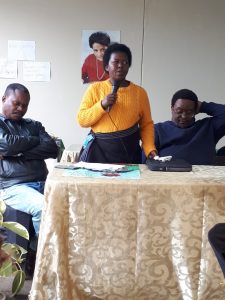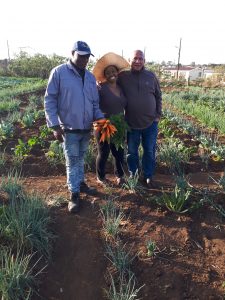In South Africa, farmers are organising to confront the climate crisis
In South Africa, a severe drought is making it harder for farming families to get ahead. With unemployment in rural areas growing, families are struggling to feed their children, and now in South Africa more than half of the population experiences hunger or is at serious risk of food shortage. The response to the growing climate crisis is not handouts, but campaigns for land rights, food sovereignty, sustainable agriculture, and access to water by defending the rights of rural women, farm workers, and small-scale farmers.
Nomasomi is one South African farmer who is facing a severe dry spell. Her dams have dried up, and now she has to water her fields by hand with water brought in by tankers. But despite the drought, Nomasomi is earning a decent living by using sustainable agricultural methods which enrich the soil, control pests, save seeds, and, importantly, reduce water use.
Nomasomi has become a strong voice in her village standing up for the rights of small-scale farmers. She is a leader in her village’s small-scale farmer association, which is supported by the Trust for Community Outreach and Education (TCOE), a partner organisation of Union Aid Abroad – APHEDA.
The TCOE is an advocacy movement that grew out of Steve Biko’s local organising and popular education during Apartheid. Biko, the founder of the Black Consciousness Movement, was murdered by the Apartheid regime in 1977, but his legacy continues today in the work of the Trust for Community Outreach and Education.
Their work includes building a powerful land rights movement in marginalised rural communities through the Inyanda National Land Rights Movement, organising rural women in the South African Rural Women’s Assembly, and building farmers unions in viticultural and horticultural sectors, where farmworkers earn just $300 dollars a month.
The people who make up this movement not only fight for land, water and the rights of rural poor, but they campaign against gender violence, and against xenophobic attacks on migrant workers. South Africans won democracy in 1994, but now they face astounding inequalities. Strong social movements and unions are the only way to win the struggles around food, wages, water, land and environment.
Support farmers organising to confront the climate crisis
As a member of Union Aid Abroad, you will be contributing to the global fight for sustainable communities and fair economies.


